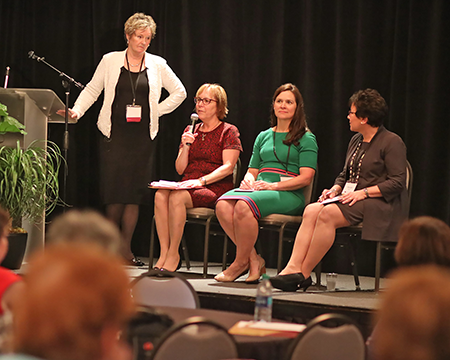Big Data Science Conference focuses on interoperability, social determinants of health and health outcomes
June 20, 2019

Nurse and health care leaders convened in Minneapolis for the seventh Nursing Knowledge: Big Data Science Conference to advance a national action plan to ensure that nursing data are captured and available in sharable, comparable formats for clinicians, researchers, policy makers and others to advance person-centered care and improve health outcomes.
“Seven years ago, about 40 nursing leaders who were passionately committed to make a difference in person-centered care and health outcomes – and fast – put their heads together. They engaged to co-create a national roadmap that would include the essential data contributed through the nurse-person relationship,” said Connie White Delaney, PhD, RN, FAAN, FNAP, University of Minnesota School of Nursing dean, about the conception of the conference. “The vision of this Big Data initiative has always been about the voice of those we care for and better health outcomes for individuals, families and communities. It was about focusing on how information systems, including the EHR and other sources of data, come together in a meaningful and synergistic way, with the goal of improving health.”
The three-day conference included reports from 11 work groups on their major achievements accomplished throughout the year and planning for the coming year. Speakers emphasized the importance of the flow of information across the continuum of care, interoperability and data analytics to support decisions, which are increasingly important with the focus on value-based care.
Cyrus Batheja, EdD, MBA, PHN, BSN, RN, chief growth officer, myConnections and national Medicaid vice president United Healthcare Community and Data, shared clear everyday life examples of using big data to better understand complex care of Medicaid members and people experiencing homelessness. Using data, which included social determinants of health, resulted in lowering their health care costs, with fewer emergency room visits and hospital admissions.
“Better care, lower costs, better outcomes, that’s the mission that we’re all on,” said Batheja.
Ensuring data flow across the care continuum
Jennifer Lundblad, PhD, MBA, president and CEO of Stratis Health, and Lisa Moon, PhD, JD, RN, assistant professor at the University of Minnesota School of Nursing, shared insights on health information technology policies and information exchanges.
With the focus on value-based care, systems are emphasizing population health to address health outcomes. However, exchange data is primarily collected in hospital and clinical spaces. “When you think about the care continuum issue and the population health issue, our EHRs are typically not accommodating the whole-person view,” said Lundblad. “There isn’t equal access to information.”
Specifically, Moon called on more nurses to be involved in policymaking related to data access, including access by the patient.
“Even though nurses represent 80% of the health care workers, our data is not represented in the exchange today,” said Moon. “That’s a policy issue that we are going to have to tackle.”
Jane Englebright, PhD, RN, CENP, FAAN, chief nurse executive, senior vice president of HCA Healthcare, discussed a technology framework and analyzing data support for nursing decision making and discussed applications of artificial intelligence.
The preconference offered three workshops. The data science principles and tools workshop was led by Lisiane Pruinelli, PhD, RN, assistant professor, University of Minnesota School of Nursing, and Steve Johnson, PhD, assistant professor, Institute for Health Informatics, University of Minnesota. The standardized data for dashboards and real time alerts for pain management workshop was led by Bonnie L. Westra, PhD, RN, FAAN, FACMI, associate professor emerita, University of Minnesota School of Nursing. The standardizing the nursing admission history and screening to reduce documentation burden workshop was led by Jane Englebright, PhD, RN, CENP, FAAN, senior vice president chief nurse executive at HCA Healthcare.
Connections made at conference are creating change
For Erin Maughan, PhD, RN, PHNA-BC, FNASN, FAAN, it’s been a whirlwind year since leaving the Nursing Knowledge: Big Data Conference in 2018. Maughan, the director of research for the National Association of School Nurses (NASN), says the relationships forged at the conference were instrumental in NASN being awarded a contract from the Centers for Disease Control and Prevention to develop a national platform to collect and analyze data pertaining to chronic conditions and their association with school absenteeism and withdrawal.
“I see here the possibilities of more partnerships as well as actually thinking that systematic change,” says Maughan, about what she expected to take away from the conference. “I glean information from who to talk to, who is the expert in documentation, or who's the expert in this area as well as getting the holistic picture on how we can empower students to take care of their health for life.”
The next Nursing Knowledge: Big Data Conference will be held June 3-5, 2020 in Minneapolis.